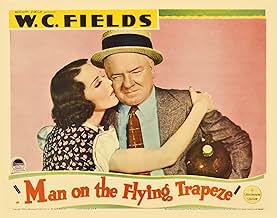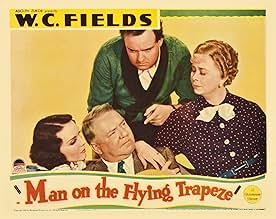Füge eine Handlung in deiner Sprache hinzuHard-working, henpecked Ambrose Wolfinger takes off from work to go to a wrestling match with catastrophic consequences.Hard-working, henpecked Ambrose Wolfinger takes off from work to go to a wrestling match with catastrophic consequences.Hard-working, henpecked Ambrose Wolfinger takes off from work to go to a wrestling match with catastrophic consequences.
- Night Court Judge
- (Nicht genannt)
- Court Officer
- (Nicht genannt)
- Office Employee
- (Nicht genannt)
- Timekeeper
- (Nicht genannt)
- Passing Motorist
- (Nicht genannt)
Empfohlene Bewertungen
Ambrose has actually been married (presumably more happily) to a previous wife, who has died. But they had a little girl (now grown up) named Hope (Mary Bryan) who is his one total ally in the family. His second wife, Leona Wolfinger, née Nesselrode (Kathleen Howard) is strict and shrewish with him. And his mother in law and brother in law Claude (Grady Sutton, playing a totally disreputable liar, trouble-maker, leech, and thief for a change) make his hell total.
In this film Fields is controlled by events and people - he rarely shows any of the spunk and cleverness that his Great McGonigal or Egbert Souse or Larson E. Whipsnade show. He tries to get two burglars charged in court, but they were drinking apple jack that he had allowed to ferment, so the idiot crabby judge ignores the burglary and charges Fields with violating the prohibition laws! He tries to see a wrestling match, but is delayed by traffic problems, a tire that runs away from him, a set of traffic cops, and arrives too late to see the match, only to be knocked down by one of the wrestlers being thrown on him. To make the situation even more absurd, he did not realize this ticket was stolen by Claude, who seeing him lying on the ground sneers at him as "Drunk again!"
He is also harried by his boss (Lucien Littlefield) at work, and he has to lie to get a miserable afternoon off to see the match (he says his mother-in-law died). When the truth comes out, Littlefield (on his own - as he subsequently regrets) fires him.
This is how it goes throughout the film. Except for Mary Bryan and for his secretary (Carlotta Monti, who has a nice moment at Littlefield's expense), all of the characters use and abuse Fields. He is only finally aroused when Claude tries to slap Hope, and Fields defends her, knocking out Claude. But even after that he still seems lost regarding what to do to pick up his life.
The film is funny - witness the business about Field's filing system at the office (he's a memory expert). When the actual head of the firm (Littlefield's boss - Oscar Apfel) tries to find things without Fields around, he goes nuts with the system. Littlefield tries to defend his action, only to be told by Monti that he has libeled her by suggesting Fields and she were out together at the match. Littlefield is then informed that if he can't get Fields back he'd better start looking for a new job (in the depression).
Howard's role is curious. Like her performance in IT'S A GIFT, she is extremely strict and suspicious. At one point, when Fields is getting ready to go down and check for burglars, she is begging for him to hurry and not to forget his gun. He takes the gun out, and accidentally fires it. High strung by the situation, the shooting scares Howard into a faint - Fields looks at her and with a slight trace of hope in his voice he asks, "Are you dead?" Yet, he did marry her, and at the end, when stuck alone with her mother and brother (who won't look for work), she seems to realize that - for better or worse - Ambrose was a good provider. In the end she is reunited with him and with her step-daughter.
It is a good comedy, and if it lacks the polish of THE BANK DICK and IT'S A GIFT and THE OLD FASHIONED WAY it is still worth watching.
The scene where W. C.'s character in sent, unwillingly, to investigate the, "burglars singing in the cellar", is one of the funniest on film. He encounters the burglars, including a young Walter Brennan with hair, in the cellar with his friends stealing W. C.'s illegal cider and singing. W. C. admires the singing and enters into the festivities. This scene, from the point where he is browbeaten into going down to check the cellar, to the point point where he is arrested by the investigating cops for making cider without a license, is comparable to anything on film, including the famous "and-a two hard boiled eggs," scene from the Marx Brothers, "Night at the Opera", or Fields own back porch scene from "Its a Gift".
I remember seeing this film broadcast about twenty years ago. I have looked to no avail for it to be rebroadcast ever since. This is such a good movie it really needs to be available.
W.C. Fields was at a lofty point in his career when he appeared in this hilarious little comedy. The second highest paid star at Paramount - only Mae West received more - he had just returned from MGM where he was featured as Wilkins Micawber in the all-star version of DAVID COPPERFIELD. Ill health would soon begin to stalk him again as a result of his dipsomania, but here he was wonderfully whimsical, whether dealing with spiteful in-laws, bullying traffic cops or bungling burglars in the cellar. With a handful of performances like this, Fields was to take permanent possession of a unique place in American film history.
Playing the two she-dragons Fields must face & fight are Kathleen Howard as his wife, and elderly Vera Lewis as her mother. Both excellent actresses, their scenes are waspish & wickedly funny and it is easy to see how together they could drive a normal male to distraction. It is unfortunate that these two skilled ladies are now nearly forgotten.
Grady Sutton is well cast as Fields' indolent, pouting brother-in-law; his comeuppance is richly deserved. That's Walter Brennan & Tammany Young as the crooning crooks who find themselves far from the banks of the Wabash.
It is interesting to note that the two women in the film who vigorously defend Fields also had close relationships with him outside the Studio. Mary Brian, as his daughter, was a longtime friend & neighbor of Fields. They had appeared together in the silent version of the story - RUNNING WILD - and Fields insisted on her inclusion in the talkie remake. Carlotta Monti, as Fields' faithful secretary, was also his longtime mistress. A part of his life for many years, she was at his side when he died on Christmas Day, 1946.
Film comedy is different than other comedy, say written comedy.
My own notions of film are that everything essential was worked out in the thirties when competing concepts elbowed each other and we ended up with the rough cinematic vocabulary we have now. Nowhere is this more true than with straight humor.
Since that time, we've developed a complex notion of the humors of irony, but what I'm talking about here is people directly depicting funny stuff.
So when you go back, you find a few innovators, something like the few jazz inventors of the 50s. What they did is pure by retrospective definition. Going back helps you discover yourself: are you a Keaton man? Chaplin, Arbuckle, Marx, Laurel?
W C Fields is one that you should experience. I liked his "Sucker" movie the best because it was his last and most mature; and the story dealt with him as Fields and the studios telling him he wasn't funny.
Here is his best early film where he does his thing. It is in the vaudeville tradition of being a bunch of loosely connected skits. But it is highly cinematic humor, just not the sight gags you see with the others. It depends all on timing.
The first sequence is the best. Our man is preparing for bed. He sneaks drinks while his witchy wife complains (in a separate bed, as this is post-code). The key joke here is him taking his socks off.
If you haven't seen it, I know this sounds odd, but Fields taking his socks off is hilarious. It takes forever. Then they hear intruders below and he puts his socks back on, taking almost as long. It is a truly precious lesson in investing in laughter. It isn't explosive. It isn't particularly subtle or clever. It is just reality bent in a complex rubato that we have to take the time to relish.
Terrific. I watched that one scene several times.
Ted's Evaluation -- 3 of 3: Worth watching.
Wusstest du schon
- WissenswertesThis was the last film directed by Clyde Bruckman. Although Bruckman's name appears on the credit, this film was actually directed by W.C. Fields, who took over after Bruckman had to quit early in the shoot due to the effects of his alcoholism. This is the only film on which Fields technically worked as his own director.
- PatzerMother-in-law Cordelia says "Well he's a fiend, a wool in sheep's clothing" ... Leona Wolfinger immediately catching the error says "What?" and immediately Cordelia corrects herself "A wolf in sheep's clothing ..." and the scene continues as if no error occurs; a great recovery.
- Zitate
Ambrose Wolfinger: My poor mother-in-law died three days ago. I'm attending her funeral this afternoon.
Ambrose's Secretary: Isn't that terrible, Mr. Wolfinger!
Ambrose Wolfinger: Yes, it's terrible. It's awful. Horrible tragedy.
Ambrose's Secretary: It must be hard to lose your mother-in-law.
Ambrose Wolfinger: Yes it is, very hard. It's almost impossible.
- VerbindungenFeatured in W.C. Fields: Straight Up (1986)
- SoundtracksOn the Banks of the Wabash, Far Away
(1897) (uncredited)
Music and lyrics by Paul Dresser
Sung a cappella by W.C. Fields, Walter Brennan, Tammany Young and Lew Kelly
Top-Auswahl
- How long is Man on the Flying Trapeze?Powered by Alexa
Details
- Erscheinungsdatum
- Herkunftsland
- Sprache
- Auch bekannt als
- Everything Happens at Once
- Drehorte
- Produktionsfirma
- Weitere beteiligte Unternehmen bei IMDbPro anzeigen
- Laufzeit1 Stunde 6 Minuten
- Farbe
- Seitenverhältnis
- 1.37 : 1
Zu dieser Seite beitragen


























